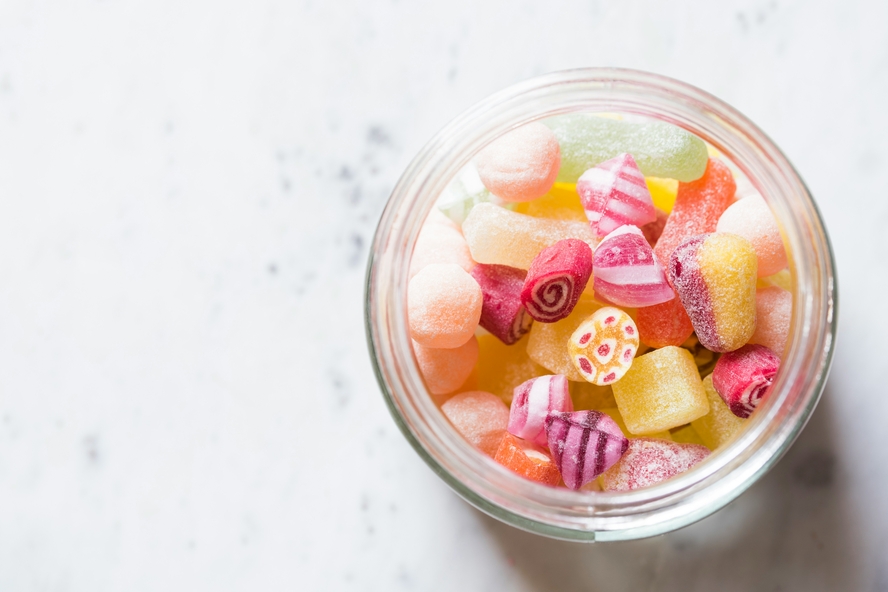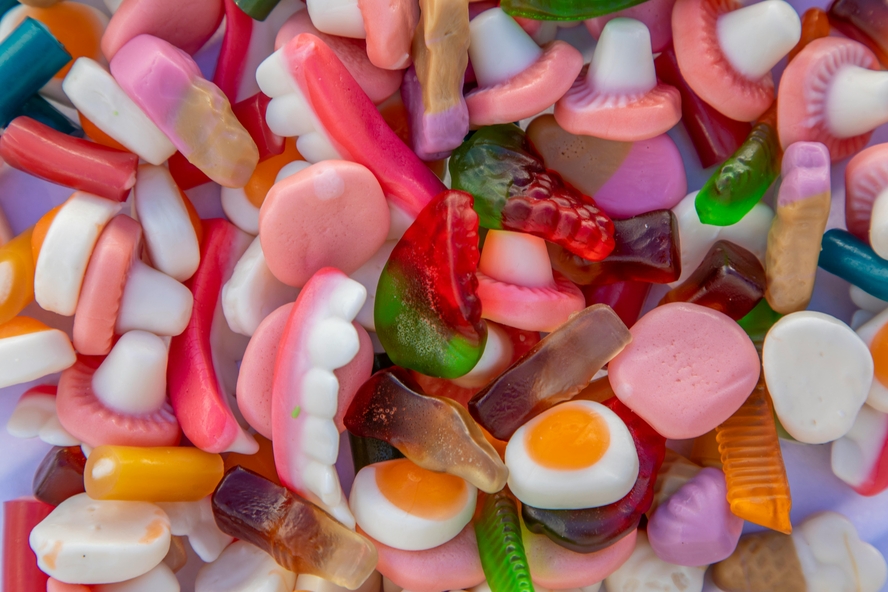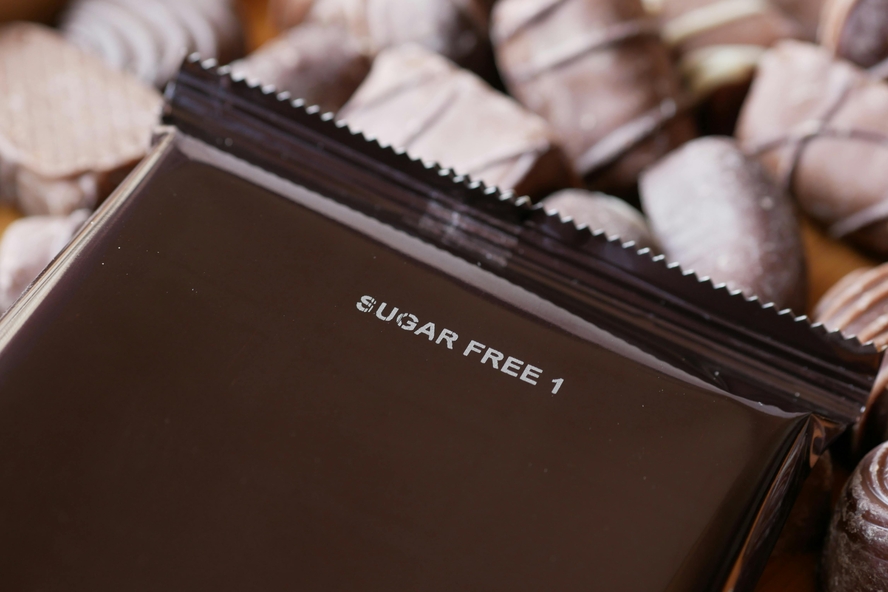
Reducing sugar in your diet or quitting sugar for good is a health goal for many of us. One simple way to do this is to replace the sugar in our diet with sugar alcohols. But as great as it is to minimize sugar in our diet, what are sugar alcohols in food really?
Before you swap out all the guilty pleasures in your pantry for sugar-free alternatives, it’s important to understand what sugar alcohols are and what they could be doing to our bodies. As a Registered Dietician, read on for my two cents on why the science shows sugar alcohols may not be as innocent of a sugar replacement as we think.
What Are Sugar Alcohols?
Sugar alcohols are a low-calorie group of sweeteners made from carbohydrate molecules resembling sugars and alcohols. These molecules are essentially sugar molecules with hydroxyl (OH) groups instead of hydrogen.
Sugar alcohols occur naturally in some fruits, vegetables, algae, and products of fermentation. It’s also produced in the human body at very low levels, so it’s possible you already have sugar alcohols in your system. However, the sugar alcohols used in food are more than likely synthetically produced and manufactured.
Are Sugar and Sugar Alcohols the Same Thing?
Because they both contain the word “sugar,” it can be easy to assume that sugar and sugar alcohols are one and the same. But sugar alcohols are different from the table sugar we are familiar with, both in structure and nutritional value.

And let’s not confuse sugar alcohols with artificial sweeteners like aspartame and sucralose. Artificial sweeteners are much sweeter than sugar alcohols (often more than 200 times sweeter, in fact1). And unlike no-calorie artificial sweeteners like Sweet‘N Low, sugar alcohols typically contain a few calories per serving.

When it comes to sweetening your food, sugar alcohols can be a reasonable alternative to table sugar. This is especially true for those with diabetes who need to limit added sugar to control and balance blood sugar levels.
Examples of popular sugar alcohols found in sweetened food products include:
- Erythritol
- Xylitol
- Mannitol
- Sorbitol
- Isomalt
- Lactitol
What Foods Contain Sugar Alcohols?
Sugar alcohols are typically found in diabetes-friendly foods like baked goods and diet drinks, as well as low-sugar ice creams, chewing gum, and hard candies. Sugar alcohols are also in many low-calorie condiments like sauces and dressings.

How Do I Know How Many Sugar Alcohols Are in My Food?
On the nutritional label, the amount of sugar alcohols is listed under “Total Carbohydrates.” Look for a subheading labeled “Sugar Alcohol” to find the amount you’re dealing with per serving.

Are Sugar Alcohols Bad for You?
Earlier this year, a group of Cleveland Clinic researchers published a new study linking high levels of the sugar alcohol xylitol with an elevated risk of cardiovascular events like clotting, heart attack, and stroke2.
Over the last ten years or so, we’ve witnessed the rise of sugar substitutes like sugar alcohols in the mainstream. Sugar alcohols are most commonly used in processed foods that are promoted as healthy alternatives. But more recently, certain sugar alcohols have come under fire for some pretty terrifying associations that could quickly counteract those “healthy” labels. Let’s dig into the research.
Sugar Alcohols and Cardiovascular Events
Earlier this year, a group of Cleveland Clinic researchers published a new study linking high levels of the sugar alcohol xylitol with an elevated risk of cardiovascular events like clotting, heart attack, and stroke2. Led by Stanley Hazen, M.D., Ph.D., the team confirmed this association via an analysis of over 3,000 patients in the US and Europe, as well as pre-clinical research models that found xylitol caused platelets to clot.
This research goes hand-in-hand with a study conducted by the same group of researchers last year, which found a similar association between erythritol and cardiovascular events3. While these studies don’t necessarily prove causation, they’re definitely enough to warrant a closer look (and cautious consumption).
Based on the study, people with the highest levels of erythritol in their blood were twice as likely to experience a heart attack or stroke4. To make matters worse, products with sugar alcohols are most commonly recommended and marketed to people who are already battling conditions like obesity and diabetes, likely putting them at an even higher risk.
Is Xylitol Bad for You?
So, the question remains: are sugar alcohols like erythritol and xylitol bad for you? “The degree of risk was not modest,” said lead study author Dr. Hazen. “It is important that further safety studies are conducted to examine the long-term effects of artificial sweeteners in general, particularly in people at higher risk for cardiovascular disease.5”
Based on the study, people with the highest levels of erythritol in their blood were twice as likely to experience a heart attack or stroke4.
Other Side Effects
Aside from the potential longer-term risks of sugar alcohol consumption, there are also some possible short-term effects of eating too many sugar-free gummy bears. If you consume sugar alcohols in excess, you could experience side effects like abdominal cramping, gas, and diarrhea6. However, this may not occur in all individuals, especially in those who are used to consuming sugar alcohols.

Some experts also say that sugar alcohol intake could lead to weight gain. However, a 2021 animal study on the sugar alcohol erythritol shows no significant effect of erythritol intake on weight gain or glucose tolerance in mice7. Human studies are needed to confirm these findings and explore the possible impact of sugar alcohols on gut health8.
What Are Considered High Levels of Sugar Alcohols?
Experts suggest that a moderate intake of sugar alcohols between 10 and 15 grams daily is safe9. However, many processed foods with sugar alcohols have much higher quantities of these substances. Be sure to look at the nutritional label of the foods you consume to avoid consuming more than this amount of sugar alcohols daily.
Is Xylitol Safe?
Remember when we said that studies have shown an association between sugar alcohols like xylitol and cardiovascular risks, but not necessarily a causation? Well, it’s understandable that you might read that and still feel confused about whether or not sugar alcohols are safe to consume.
Essentially, what this means is that more studies need to be done to better determine if there are health risks of consuming xylitol. However, it’s safe to say it’s still best to consume in moderation. While we wait for more conclusive research, it’s not a bad idea to limit your reliance on sugar substitutes. Try incorporating natural sweeteners like honey or agave, or consider reaching for a fruit to satisfy your sweet tooth instead.
Are There Any Health Benefits of Sugar Alcohols?
Research is still early in determining if sugar alcohols hold any health benefits. One of the most common arguments around the benefits of sugar alcohols is that they do not impact glucose or insulin levels10. Therefore, it could be an ideal sugar alternative for those with diabetes or those at risk of diabetes.
Sugar alcohols also show the potential to benefit dental health. Unlike sugar, which helps the harmful bacteria in your mouth thrive (and can cause cavities and tooth decay!), certain sugar alcohols directly suppress the growth of bacteria10. Xylitol and sorbitol are also the focus of future research on dental caries prevention11. So, if your toothpaste contains any sugar alcohols, you want to keep it around.

The Bottom Line
After reviewing the research, there is still not enough to prove that sugar alcohols aren’t safe in moderation. If you are trying to cut out sugar from your diet, whether you have diabetes or not, sugar alcohols may be a healthy alternative to try. The most important thing is to moderate your intake of both sugar and sugar alcohols.
Do your best to avoid any intake of over 15 grams of sugar alcohols. Aim to use them as a stepping stone to eliminating sugar as much as possible, rather than a free hall pass to gorge on sweet treats without consequence. If you tend to overdo it with sugar, sugar alcohols could be a good alternative.
Sources:
- https://www.fda.gov/food/food-additives-petitions/aspartame-and-other-sweeteners-food
- https://newsroom.clevelandclinic.org/2024/06/06/cleveland-clinic-led-study-links-sugar-substitute-to-increased-risk-of-heart-attack-and-stroke
- https://newsroom.clevelandclinic.org/2023/02/27/cleveland-clinic-study-finds-common-artificial-sweetener-linked-to-higher-rates-of-heart-attack-and-stroke
- https://www.nature.com/articles/s41591-023-02223-9
- https://www.cnn.com/2023/02/27/health/zero-calorie-sweetener-heart-attack-stroke-wellness/index.html
- https://pubmed.ncbi.nlm.nih.gov/27840639/
- https://pubmed.ncbi.nlm.nih.gov/34091676/
- https://pmc.ncbi.nlm.nih.gov/articles/PMC7378387/
- https://health.clevelandclinic.org/what-to-know-about-sugar-alcohols
Source link
